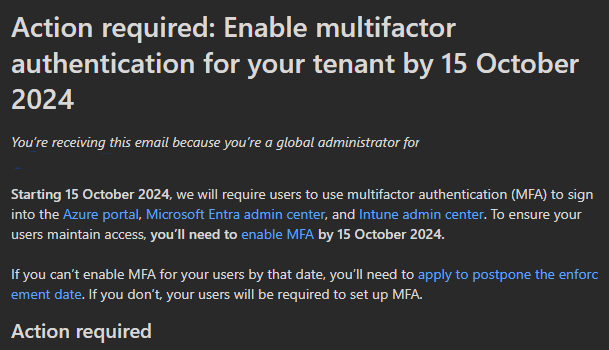In today’s digital landscape, cybersecurity has become more critical than ever. With increasing threats and sophisticated attacks, organizations must proactively protect their data and systems. Recognizing this need, Microsoft has recently announced a new requirement for Multi-Factor Authentication (MFA) across its platforms. Here’s what you need to know about this significant update and how it will impact your organization.
Multi-factor authentication (MFA) is a security measure requiring users to provide two or more verification factors to access a resource, such as an application, online account, or VPN. Rather than just asking for a username and password, MFA requires one or more additional verification factors, which can include:
By combining multiple forms of authentication, MFA adds an extra layer of security, making it significantly more difficult for unauthorized individuals to access sensitive information.
Microsoft’s decision to mandate MFA stems from the growing need to enhance security in the face of escalating cyber threats. Passwords alone are no longer sufficient to protect against breaches. Phishing attacks, password guessing, and credential stuffing are just a few examples of the tactics used by cybercriminals to gain unauthorized access.
According to Microsoft’s research, accounts protected by MFA are 99.9% less likely to be compromised. With such a dramatic risk reduction, it’s clear why Microsoft is pushing for broader adoption of this security measure.
If you or your organization uses Microsoft services, such as Microsoft 365, Azure, or Dynamics 365, you must implement MFA for all accounts. This change will apply to new and existing accounts, and organizations must ensure that their users are set up with the necessary authentication methods.
Here are a few key points to consider:
The benefits of implementing MFA extend beyond merely complying with Microsoft’s requirements. By adopting MFA, organizations can:
Microsoft’s new MFA requirement is more than just a policy update—it’s a call to action for organizations to prioritize security and take tangible steps to protect their digital assets. While implementing MFA may require some adjustments, the benefits far outweigh the potential challenges. By staying informed, preparing your users, and integrating MFA into your security strategy, you can ensure a seamless transition and bolster your defenses against the ever-present threat of cyberattacks.
If you want to learn more about how MFA benefits your company, or how to secure your organization, contact CCP to help!
Contact us today for a Free IT Consultation. In the meantime, read about what others have said about our services.
